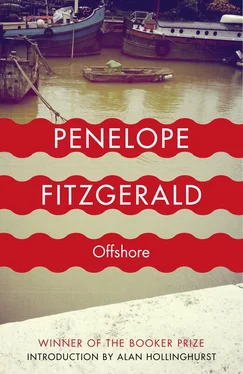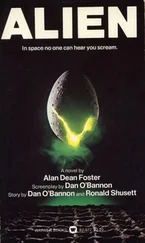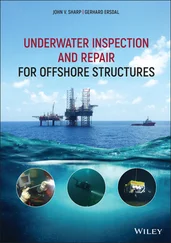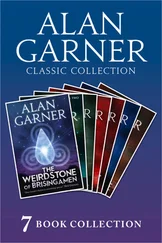Offshore
Penelope Fitzgerald

From the reviews of Offshore: From the reviews of Offshore Penelope Fitzgerald Introduction 1 2 3 4 5 6 7 8 9 10 By the same author Copyright About the Publisher
‘Perfectly balanced … the novelistic equivalent of a Turner watercolour.’
Washington Post
‘This is an astonishing book. Hardly more than 50,000 words, it is written with a manic economy that makes it seem even shorter, and with a tamped-down force that continually explodes in a series of exactly controlled detonations. Offshore is a marvellous achievement: strong, supple, humane, ripe, generous and graceful.’
Sunday Times
‘A novel of crisp originality, lucid and expressive with splendid bursts of satire.’
Observer
‘She writes the kind of fiction in which perfection is almost to be hoped for, unostentatious as true virtuosity can make it, its texture a pure pleasure.’
London Review of Books
Cover
Title Page Offshore Penelope Fitzgerald
From the reviews of Offshore From the reviews of Offshore: From the reviews of Offshore Penelope Fitzgerald Introduction 1 2 3 4 5 6 7 8 9 10 By the same author Copyright About the Publisher ‘Perfectly balanced … the novelistic equivalent of a Turner watercolour.’ Washington Post ‘This is an astonishing book. Hardly more than 50,000 words, it is written with a manic economy that makes it seem even shorter, and with a tamped-down force that continually explodes in a series of exactly controlled detonations. Offshore is a marvellous achievement: strong, supple, humane, ripe, generous and graceful.’ Sunday Times ‘A novel of crisp originality, lucid and expressive with splendid bursts of satire.’ Observer ‘She writes the kind of fiction in which perfection is almost to be hoped for, unostentatious as true virtuosity can make it, its texture a pure pleasure.’ London Review of Books
Penelope Fitzgerald
Introduction
1
2
3
4
5
6
7
8
9
10
By the same author
Copyright
About the Publisher
Penelope Fitzgerald
Preface by Hermione Lee, Advisory Editor
When Penelope Fitzgerald unexpectedly won the Booker Prize with Offshore , in 1979, at the age of sixty-three, she said to her friends: ‘I knew I was an outsider.’ The people she wrote about in her novels and biographies were outsiders, too: misfits, romantic artists, hopeful failures, misunderstood lovers, orphans and oddities. She was drawn to unsettled characters who lived on the edges. She wrote about the vulnerable and the unprivileged, children, women trying to cope on their own, gentle, muddled, unsuccessful men. Her view of the world was that it divided into ‘exterminators’ and ‘exterminatees’. She would say: ‘I am drawn to people who seem to have been born defeated or even profoundly lost.’ She was a humorous writer with a tragic sense of life.
Outsiders in literature were close to her heart, too. She was fond of underrated, idiosyncratic writers with distinctive voices, like the novelist J. L. Carr, or Harold Monro of the Poetry Bookshop, or the remarkable and tragic poet Charlotte Mew. The publisher Virago’s enterprise of bringing neglected women writers back to life appealed to her, and under their imprint she championed the nineteenth-century novelist Margaret Oliphant. She enjoyed eccentrics like Stevie Smith. She liked writers, and people, who stood at an odd angle to the world. The child of an unusual, literary, middle-class English family, she inherited the Evangelical principles of her bishop grandfathers and the qualities of her Knox father and uncles: integrity, austerity, understatement, brilliance and a laconic, wry sense of humour.
She did not expect success, though she knew her own worth. Her writing career was not a usual one. She began publishing late in her life, around sixty, and in twenty years she published nine novels, three biographies and many essays and reviews. She her third novel, was a surprise to everyone. But, by the end of her life, she had been shortlisted for it several times, had won a number of other British prizes, was a well-known figure on the literary scene, and became famous, at eighty, with the publication of The Blue Flower and its winning, in the United States, the National Book Critics Circle Award.
Yet she always had a quiet reputation. She was a novelist with a passionate following of careful readers, not a big name. She wrote compact, subtle novels. They are funny, but they are also dark. They are eloquent and clear, but also elusive and indirect. They leave a great deal unsaid. Whether she was drawing on the experiences of her own life – working for the BBC in the Blitz, helping to make a go of a small-town Suffolk bookshop, living on a leaky barge on the Thames in the 1960s, teaching children at a stage-school – or, in her last four great novels, going back in time and sometimes out of England to historical periods which she evoked with astonishing authenticity – she created whole worlds with striking economy. Her books inhabit a small space, but seem, magically, to reach out beyond it.
After her death at eighty-three, in 2000, there might have been a danger of this extraordinary voice fading away into silence and neglect. But she has been kept from oblivion by her executors and her admirers. The posthumous publication of her stories, essays and letters is now being followed by a biography ( Penelope Fitzgerald: A Life , by Hermione Lee, Chatto & Windus, 2013), and by these very welcome reissues of her work. The fine writers who have provided introductions to these new editions show what a distinguished following she has. I hope that many new readers will now discover, and fall in love with, the work of one of the most spellbinding English novelists of the twentieth century.
‘Everything that you learn is useful,’ says the eleven-year-old Martha in Offshore . ‘Didn’t you know that everything you learn, and everything you suffer, will come in useful at some point in your life?’ Her little sister complains she is merely parroting the wisdom of their schoolteacher, Mother Ignatius, but Penelope Fitzgerald herself is surely standing close behind her. All Fitzgerald’s books are the product of maturity, reflection, the quickly touched depth of accumulated knowledge and long experience. Their creation reflects the new sense of opportunity that may come with the bereavements and displacements of later life. It was after her father, Edmund Knox, died in 1971 that she wrote her first book, a life of the artist Edward Burne-Jones, which came out in 1975, when Fitzgerald was fifty-nine. Her father himself became one of the subjects of her next book, the remarkable joint biography The Knox Brothers , published in 1977. Both these biographies draw on a lifelong exposure to, and reckoning with, the artistic, intellectual and spiritual life of the generations immediately before her own, made vital to her through her own extraordinary family. After this, Fitzgerald’s first extended fiction, The Golden Child , was written to entertain her husband Desmond before his death in 1976; the eight novels, the stories, the further biography and all the luminous journalism that followed were thus the work of a quarter-century of widowhood.
As a novelist Penelope Fitzgerald drew at first quite directly on her own life, discovering, in her late shift of circumstance and perspective, the potential for making distinctive art out of several earlier episodes in an often difficult and ramshackle career. Her period working in a Southwold bookshop had fed The Bookshop (1978), and in Offshore (1979) she turned to the years, her lowest and most difficult, living on an old Thames sailing barge on Battersea Reach; later, Human Voices (1980) would draw on her years of employment at the BBC during the war, and At Freddie’s (1982), her most exuberantly comic novel, on her time as a teacher at the Italia Conti stage school. Offshore too is at times very funny, though tonally it is the most mercurial of all her books. She herself called it a ‘tragi-farce’.
Читать дальше













